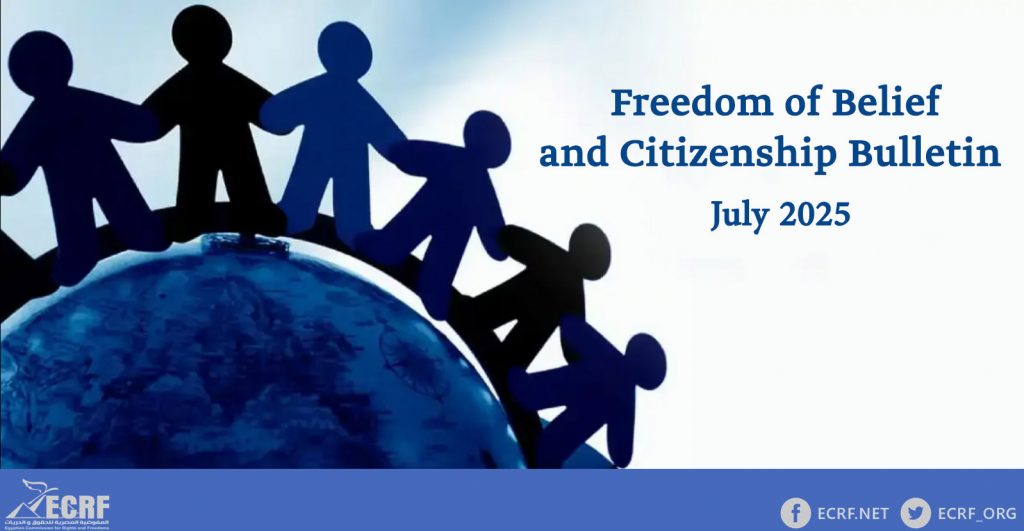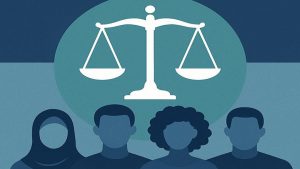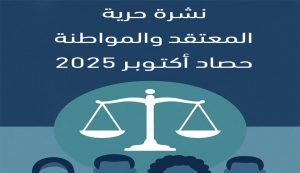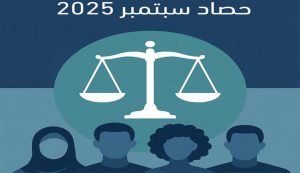The Egyptian Commission for Rights and Freedoms launches its special bulletin on “Freedom of Belief and Citizenship”, aiming to shed light on
the concerns and problems of minorities, promote a culture of tolerance, reject violence and hate speech, and uphold the values of citizenship. In this issue, the Commission highlights the most significant developments and violations related to freedom of belief and citizenship during the month of July 2025.
The 2014 Constitution guarantees protections for the freedom of religion or belief, including articles 53, 64, and 235. Additionally, the Penal Code introduced a dedicated section addressing such crimes under a new title: Misdemeanors Related to Religions and Combating Discrimination, according to Law No. 126 of 2011, issued on 15/10/2011 during the rule of the Supreme Council of the Armed Forces. This law added a new article prohibiting discrimination among citizens and criminalizing such behavior. The section consists of three articles that criminalize acts of violence against any religious belief and fully protect citizens’ right to freely practice their religious rituals in accordance with their beliefs.
Article 27 of the International Covenant on Civil and Political Rights stipulates:
“In those States in which ethnic, religious or linguistic minorities exist, persons belonging to such minorities shall not be denied the right, in community with the other members of their group, to enjoy their own culture, to profess and practise their own religion, or to use their own language.”
The United Nations Strategy and Plan of Action on Hate Speech (2019) defines hate speech as communication that “attacks or uses pejorative or discriminatory language with reference to a person or a group on the basis of who they are—in other words, based on their religion, ethnicity, nationality, race, color, descent, gender or other identity factor.”
The Egyptian Constitution, in Article 53, affirms that incitement to hatred is a crime punishable by law. It states:
“Citizens are equal before the law. They are equal in rights, freedoms, and public duties, without discrimination based on religion, belief, sex, origin, race, color, language, disability, social status, political or geographic affiliation, or any other reason. Discrimination and incitement to hatred are crimes punishable by law. The state shall take necessary measures to eliminate all forms of discrimination, and the law shall regulate the establishment of an independent commission for this purpose.”
Below are the most significant developments and violations observed in the field of “freedom of belief and citizenship”during the month of July 2025:
Freedom of Belief and Citizenship News:
- On July 1, 2025, Dr. Osama Al-Azhari, Minister of Religious Endowments, met with Bishop Jose Cardinal Advincula, Archbishop of Manila, during his official visit to the Philippines. The meeting, which reflected the deep mutual respect and appreciation between religious leaders in Egypt and the Philippines, was arranged and attended by Ambassador Nader Zaki, Egypt’s Ambassador to the Philippines, along with members of the Egyptian mission.
At the beginning of the meeting, the Cardinal welcomed the Minister and praised his historic visit, describing it as a pioneering step toward promoting interfaith dialogue and opening new horizons for joint cooperation, especially in the fields of cultural exchange, combating extremism, and promoting values of coexistence and collaboration.
During the meeting, Dr. Al-Azhari praised the cooperation between the two religious institutions in Egypt and the Philippines, reflecting Egypt’s approach to supporting values of peaceful coexistence and enhancing social peace.
The Minister also noted the honor of being assigned by the President of the Republic to represent Egypt at the funeral ceremonies held for Pope Francis at the Vatican, which he described as a clear expression of the great respect the Egyptian state holds for the global Catholic Church and its role in spreading the values of peace and love.
At the conclusion of the meeting, the Minister extended an official invitation to the Cardinal and the Council of Bishops of the Philippines to visit Egypt and the route of the Holy Family, a visit rich with deep symbolic and spiritual significance that affirms the strong bonds between peace-loving peoples. - On July 3, 2025, the Coptic Orthodox Church emphasized in an official statement that Christian marriage is a sacred sacrament based on mutual understanding and commitment between both parties, and that there are clear and specific grounds for entering into and dissolving marriage—such as adultery or the apostasy of either party—not merely changing denomination or sect.
The statement added that using a change of denomination as a means to obtain a divorce is considered a departure from the principles of Christian faith and a violation of the spirit of the law. This method will no longer be recognized in the future and will be deemed a nullification of the true meaning of marriage.
Church sources stated that this decision came after repeated cases where one spouse sought to change their denomination solely to obtain a divorce ruling, without any actual change in belief or faith—acts considered manipulative and a breach of the spiritual regulations governing marriage and divorce within the Church.
The Orthodox Church affirmed that Christian marriage follows strict rules that include the unity of denomination between spouses, and that any subsequent change in denomination does not affect the validity or reference of the existing marriage. Instead, matters are governed by the doctrine of the original denomination in which the marriage was conducted.
Regarding other Christian denominations, Bishop Paula, head of the personal status affairs at the Orthodox Church, stated that the new draft law regulates marriage and divorce matters based on what Christian denominations in Egypt agree upon. Unified legal articles are applied in matters of consensus, while each denomination applies its own regulations in matters of disagreement. - On July 4, 2025, Archbishop Dr. Samy Fawzy, Archbishop of the Anglican Episcopal Province of Alexandria, visited Major General Emad Kadwani, Governor of Minya, to discuss and support activities related to dialogue and community understanding, contributing to the realization of the Egyptian state’s strategy. The meeting was attended by Bishop Dr. Mounir Hanna, honorary archbishop and director of the Christian-Islamic Center, Dr. Mohamed Abu Zaid, coordinator of the Egyptian Family House, and Moqqar Al-Omda, coordinator of the Family House in Minya.
Archbishop Dr. Samy Fawzy expressed his deep pleasure in meeting with Governor Emad Kadwani, appreciating the warm reception and praising the strong cooperation between state institutions and the Church in supporting issues of social peace.
He stressed the importance of having permanent platforms for dialogue, considering them a fundamental pillar for strengthening mutual understanding and peaceful coexistence. He also presented to the Governor the most prominent activities of the Christian-Islamic Center for Peacebuilding, particularly in the area of specialized training for capacity building in dialogue, reconciliation, and peacebuilding.
· · On July 6, 2025, Member of Parliament Evelyn Matta stated that the draft education law proposed by the government, currently under discussion in the House of Representatives, must include several amendments.
Matta called for the Ministry of Education and Technical Education to be obligated to teach more than one language in all schools alongside Arabic. She stressed that no other languages should be excluded or eliminated, whether in public schools, private schools, language schools, or international schools.
She also emphasized that religious education should not be considered a core subject requiring a 70% passing grade. Instead, she called for it to be treated as a regular subject, not included in the total grade average, as was the case in the past.
Matta noted the lack of specialized teachers in Christian religious education, which often results in students being assigned to any available Christian teacher at the school, regardless of their original subject—whether vocational, science, or social studies. These teachers would simply read the textbook aloud when they had free time, a practice that has persisted for decades.
· · On July 7, 2025, the House of Representatives, chaired by Counselor Dr. Hanafy Gebaly, approved Article (6)included in Article One of the amended Education Law. This article stipulates that the passing grade for religious education is 70%.
The approved article states that Arabic language, religious education, and national history are core subjects at all educational stages. The Minister of Education and Technical Education determines the content, grading, and weight of each subject in the overall score.
The key provision requires students to obtain at least 70% of the allocated grade in religious education to pass, while confirming that the grades in this subject will not be counted toward the total cumulative score. The Ministry is also tasked with organizing regular religious education competitions and awarding prizes and incentives to outstanding students.
The session witnessed wide debate over the 70% threshold. MPs Amira El-Adly, Mohamed Abdel Aziz, and Ihab Mansour called for the percentage to be reduced to 50%, arguing that the current rate may pose challenges—especially regarding the availability of qualified teachers for both Islamic and Christian religious education.
· · On July 9, 2025, the World Heritage Committee of the United Nations Educational, Scientific and Cultural Organization (UNESCO) officially approved the removal of Abu Mena Monastery in Borg El Arab, Alexandria, from the List of World Heritage in Danger.
The decision was made during the 47th session of the World Heritage Committee held at UNESCO headquarters in Paris, after reviewing the 2025 report by the joint Reactive Monitoring Mission of the World Heritage Centre and the International Council on Monuments and Sites (ICOMOS). The report highlighted the notable progress made in the preservation and safeguarding of the Abu Mena archaeological site, especially the establishment of an effective monitoring system for groundwater levels, which has proven successful through continuous periodic measurements.
The Abu Mena Monastery area is considered one of the most significant heritage sites with exceptional historical and cultural value. It was the second Christian pilgrimage destination after Jerusalem and has been listed as a UNESCO World Heritage Site since 1979 in recognition of its religious and architectural importance.
Among the most prominent archaeological and architectural discoveries at the Abu Mena site are the well containing the tomb of Saint Menas, the Great Church, and the Pilgrims’ Square—all of which reflect the site’s profound spiritual and architectural significance.
· On July 11, 2025, Dr. Naguib Gabriel, President of the Egyptian Union for Human Rights and a personal status expert, stated that the current personal status law for Christians is no longer suitable for present-day realities. He explained that its application within the Orthodox Church is limited to two grounds for divorce: adultery or conversion of religion—both of which are legally difficult to prove, resulting in worsening social crises and increasingly complex situations for hundreds of thousands of families.
Gabriel clarified that divorce cases among Christians account for 20 to 25% of all marriages, according to recent studies. He also pointed out that unofficial statistics estimate around 270,000 unresolved divorce cases, with some spouses resorting to illegitimate means to obtain certificates of religious conversion in order to bypass difficult divorce procedures.
He described what he called a “divorce marathon,” referring to the cooperation protocol between the Orthodox Church and the Syriac Orthodox Church, which allows some individuals to change denominations, obtain a civil divorce, and then apply for a new marriage permit from the Church—a process fraught with complications.
Gabriel noted that some wives are unable to prove adultery in court, yet the Church may still grant a new marriage permit if it is convinced of marital betrayal. He added that “constructive adultery”—such as email exchanges or Facebook conversations—cannot easily be detected by law, despite being an indication of marital breakdown.
He revealed that, under recent amendments, the new law requires a separation period of at least three years (with or without children) before filing for divorce, significantly easing the previous five-year condition.
Gabriel welcomed the new provision preventing abuse through religious denomination switching, stating that the Church laws in which the marriage was conducted shall apply regardless of any later change in denomination. He affirmed this would close legal loopholes and prevent manipulation of the system to obtain divorce.
He emphasized that the new law has become an urgent necessity, not just a legislative amendment, adding: “I cannot wait another five years for a 40-year-old woman to receive a marriage certificate. That would mean she misses the chance to build a new family.” He stressed that the goal is to pass a law that strikes a balance between Christian doctrine and changing social realities.
· On July 14, 2025, Dr. Reverend Andrea Zaki, President of the Evangelical Community in Egypt, received a delegation from the Association of Theological Institutes in the Middle East (ATIME), as part of efforts to strengthen theological cooperation and share academic expertise among Christian educational institutions in the region.
The delegation included:
Fr. Dr. Michael Qanbar, ATIME Executive Secretary;
Fr. Dr. Jack Khoury, ATIME Executive Director;
Rev. Rifaat Fikry, Associate General Secretary of the Middle East Council of Churches;
Dr. Rev. Samuel Rizvi, Dean of the Evangelical Theological Seminary in Cairo;
Dr. Gergis Saleh, Honorary Secretary General of the Middle East Council of Churches;
Father Bishoy Helmy, Representative of the Council of Churches of Egypt;
Father Antoine Al-Ahmar, a leading figure in theological education in Lebanon.
At the start of the meeting, Dr. Reverend Andrea Zaki welcomed the delegation, commending ATIME’s role in developing theological education in the region and affirming that theological education is a cornerstone for renewing religious thought and forming leaders who combine academic knowledge with personal piety.
He added: “We in the Evangelical Community believe in the importance of building the capacities of clergy and church leaders through an integrated academic and spiritual formation—one that merges steadfast faith with responsible engagement in human and societal issues.”
· On July 21, 2025, Dr. Osama Al-Azhari, Minister of Religious Endowments, met with Dr. Safwat El-Nahhas, Chairman of the Board of Trustees of the National Council for Training and Education, to discuss mechanisms of cooperation in developing training programs for imams and ministry personnel. The meeting took place in light of the ministry’s comprehensive plan to qualify and enhance human resources, with several key leaders from both sides in attendance.
The discussion focused on training areas coordinated directly with the National Council for Training and Education, and emphasized the ministry’s upcoming comprehensive development of its qualification system, in line with directives from President Abdel Fattah El-Sisi.
The Ministry of Endowments’ strategy for the coming period includes four primary paths for imam training:
1. Confronting religious extremism and terrorism in all its forms, by preparing imams capable of dismantling extremist ideology and delivering sound religious discourse.
2. Combating irreligious extremism and destructive behaviors, by using sermons and lessons to address social phenomena such as addiction, suicide, and bullying.
3. Rebuilding the Egyptian personality from both religious and national standpoints, to instill values of belonging, knowledge, openness, and trust in oneself and national institutions.
4. Contributing to civilizational progress, by promoting scientific and creative awareness in society and encouraging youth toward discovery and invention.
· On July 26, 2025, the Evangelical Community in Egypt, under the leadership of Dr. Reverend Andrea Zaki, expressed its deep appreciation for the “historic and unwavering” role played by the Egyptian state in supporting the Palestinian cause.
In an official statement, the Community emphasized that this role reflects the values of justice, wisdom, and humanitarian responsibility that have long characterized Egypt’s regional policy.
The statement firmly rejected any attempts to undermine or question Egypt’s pivotal role, describing such attempts as “detached from truth and human conscience.”
It stressed that Egypt—its leadership and people—has always been, and continues to be, at the forefront of supporters of the Palestinian people and their legitimate rights, and continues to work tirelessly to alleviate their suffering.
Deliberations on Freedom of Belief and the Civil State:
· On July 21, 2025, writer and media figure Ibrahim Eissa expressed strong reservations about the use of the expression “Christian brothers” in official or ceremonial speeches, asserting that this type of discourse does not align with the principles of nationalism or politics, but rather entrenches religious discrimination in a state that is supposed to be based on equality and citizenship.
Eissa stated: “I deeply and strongly object to this expression, just as I object to the expression ‘Muslim brothers’; the nation is neither a sect nor a creed.”
He added that “the greater problem lies in the attempt to ‘religionize nationalism’ — that is, to tie patriotism and loyalty to the nation to religious reasons or motives, as if true loyalty can only be achieved through faith,” viewing this tendency as an inappropriate insertion of religion into domains where it does not belong.
Eissa explained that nations are legal entities that neither go to heaven nor hell, nor are they judged on the Day of Judgment. He affirmed that there is no such thing as a “Christian state” or an “Islamic state”; rather, there are states where the majority of the population adheres to a certain religion — whether Muslim, Christian, Jewish, or even atheist.
He concluded by saying: “The modern state is not built on religious affiliation, but on the social contract and citizenship. Reducing national belonging to religious belonging is dangerous — it is precisely what, for many years, paved the way for extremist currents to dominate the public sphere under the guise of false patriotism.”
Under the Microscope:
· On July 11, 2025, MP Freddy El-Bayadi, member of the House of Representatives, stated that the long delay in issuing the Personal Status Law for non-Muslims is unjustified, despite the completion of its drafting and the consensus reached among the various Christian denominations. He affirmed that this law has become an urgent legislative and societal necessity.
El-Bayadi explained, during an interview with journalist Hamdy Rizk on the “Nazarah” program aired on Sada El-Balad channel, that the law has faced years of postponement, even though it was drafted in full cooperation among different churches and its draft was reviewed by the Ministry of Justice nearly a year ago. A broad societal dialogue was also conducted, with participation from various denominations, resulting in minor amendments that were approved by the churches and returned to the ministry.
The MP added that the law relies on the general principles of Christianity rather than detailed legal codes, leading to varying interpretations among denominations. This has caused significant social issues over decades, including problems related to divorce, second marriages, and inheritance — all of which necessitate the prompt issuance of the law.
He noted that the 2014 Constitution granted Christians the right to refer to their own religious laws in personal status matters through Article 3, paving the way for this legislation. Previously, the matter was hindered by Article 2 of the Constitution, which identifies the principles of Islamic Sharia as the main source of legislation.
El-Bayadi concluded by emphasizing that the law represents an urgent humanitarian issue, not merely a legislative priority, pointing out that hundreds of families suffer due to the absence of a legal framework that would allow them to resolve their issues within the justice system.
· On July 14, 2025, the organization World Heritage Watch warned of a “serious imminent threat” facing Saint Catherine’s Monastery in Mount Sinai — one of the holiest and oldest religious and cultural sites in the world — calling on UNESCO to place it on the List of World Heritage in Danger.
In an open letter addressed to the UNESCO World Heritage Committee, the organization expressed concern about ongoing tourism and development projects around the monastery, describing them as “transforming the sacred landscape into a noisy commercial and tourist zone,” amid a clear failure by the Egyptian government to comply with international convention recommendations.
In an extensive report supported by documents and images, the organization pointed out that Egypt has not complied with the suspension of construction activities as previously requested by UNESCO, resulting in “severe damage to the site’s outstanding universal values.”
The organization’s president, Stephan Dömpke, stated: “Egypt continues to provide UNESCO with misleading or incomplete information. It is time for UNESCO to be clear: its patience is running out. The isolation and serenity of the area are among the core values that must be protected by all means.”
World Heritage Watch called for the current session of the World Heritage Committee to include the following in its resolutions: confirmation of the Greek Orthodox Church’s ownership of Saint Catherine’s Monastery and its properties; recognition of the real risks posed by development, transportation, and institutional changes; dispatching a joint UNESCO–ICOMOS monitoring mission within three months; and considering the site’s inscription on the “World Heritage in Danger” list if the mission is not carried out within the specified timeframe.
Violence Based on Belief and Hate Speech:
· On July 5, 2025, Ishak Ibrahim, a researcher at the Egyptian Initiative for Personal Rights (EIPR), stated that the verbal assault on a Christian exam supervisor during high school final exams was not merely an individual insult but rather opened the door for discussing deeper and more dangerous societal and institutional issues.
Ibrahim emphasized that one of the most alarming aspects of the incident was the use of the word “Christian” as an insult, which reflects a widespread condescending attitude toward Christian citizens in large sectors of society. He added that the official discourse by politicians and religious institutions promoting equality and coexistence has so far failed to create real change on the ground.
He pointed out that the Ministry of Education remained silent about the incident, as if it were not concerned, although a simple statement expressing its position and appreciating the teacher’s refusal to allow cheating could have sufficed. Ibrahim also criticized the Teachers’ Syndicate, accusing it of failing to defend one of its members, and even reportedly intervening to arrange a “reconciliation” between the assaulted teacher and the parents rather than offering her clear support.
Ibrahim also addressed what he described as a “highly conservative popular religiosity” that accommodates socially unacceptable behaviors such as cheating and lying. He argued that this culture fuels and justifies such incidents under the guise of superficial religiosity. He concluded by affirming that addressing such incidents requires genuine cultural and institutional reform, beginning with acknowledging the problem instead of ignoring or covering it up.
· On July 12, 2025, Dr. Samah Fawzy, academic and journalist, analyzed the incident in which a Christian schoolteacher was assaulted by some parents who wanted to allow cheating during exams. While presenting his program “End of the Week” on the Coptic Orthodox channel ME Sat, he noted that there have been many incidents of exam supervisors being attacked for refusing to allow cheating in examination halls.
He explained that cheating has become a widespread social practice, with answer sheets being leaked and individuals helping students cheat during exams, alongside public calls for facilitating mass cheating. He added that this phenomenon is not new but has worsened over time, to the point that some students and parents now view it as a presumed right.
Fawzy pointed to the distortion of values in society, where cheating is seen as a form of “compassion,” while adherence to the rules is viewed as “cruelty.” He then addressed the sectarian aspect of the incident, emphasizing that the teacher was subjected to bullying, verbal abuse, and attacks based on her religious identity.
· On July 16, 2025, social media users circulated a post by a teacher named Iman Lotfy, warning her female students against joining a trend involving a particular way of wearing the hijab.
In her post, the teacher wrote:
“My dear students… next year, God willing, if you show up in class dressed like that, I will personally lock the door and pin your headscarf around your neck with a box of pins—the one you’re so happy about. Enjoy your summer vacation, sweethearts.”
The post sparked significant controversy, with some supporting the teacher’s stance and others criticizing it. In response to the backlash, the teacher said:
“Someone might say I have no right to control what they wear. Well, I do have the right. You wouldn’t be allowed into an opera house without formal attire.”
She added:
“Every workplace has a dress code—you can’t just show up however you like. These are my rules as an Arabic teacher. I’m not being harsh; the girls know I’m joking with them, and they love me for it.”
Regarding her educational mission, the teacher stated:
“I’m not perfect, and neither are they. But as a reminder—even if just a few years separate me from them—I’m a mentor before I am a teacher. God will hold me accountable not only for the lessons and grades, but also for their moral development and behavior.”




